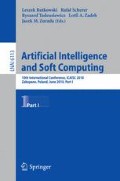Abstract
Neuro-fuzzy systems are eagerly used for classification and machine learning problems. Researchers find them easy to use because the knowledge is stored in the form of the fuzzy rules. The rules are relatively easy to create and interpret for humans, unlike in the case of other learning paradigms e.g. neural networks. The most commonly used neuro-fuzzy systems are Mamdani (linguistic) and Takagi Sugeno systems. There are also logical-type systems which are well suited for classification tasks. In the paper, another type of fuzzy systems is proposed, i.e. multi-input multi-output systems with additional binary relation for greater flexibility. The relation bonds input and output fuzzy linguistic values. Thanks to this, the system is better adjustable to learning data. The systems have multiple outputs which is crucial in the case of classification tasks. Described systems are tested on several known benchmarks and compared with other machine learning solutions from the literature.
Access this chapter
Tax calculation will be finalised at checkout
Purchases are for personal use only
Preview
Unable to display preview. Download preview PDF.
References
Asuncion, A., Newman, D.J.: UCI Machine Learning Repository. University of California, School of Information and Computer Science, Irvine (2007), http://www.ics.uci.edu/~mlearn/MLRepository.html
Babuska, R.: Fuzzy Modeling For Control. Kluwer Academic Press, Boston (1998)
Bezdek, J.C., Pal, S.K.: Fuzzy Models for Pattern Recognition. IEEE Press, New York (1992)
Bezdek, J., Keller, J., Krisnapuram, R., Pal, N.R.: Fuzzy Models and Algorithms for Pattern Recognition and Image Processing. Kluwer Academic Press, Dordrecht (1999)
Branco, P.J.C., Dente, J.A.: A Fuzzy Relational identification Algorithm and its Application to Predict the Behaviour of a Motor Drive System. Fuzzy Sets and Systems 109, 343–354 (2000)
Dong, M., Kothari, R.: Look-ahead based fuzzy decision tree induction. IEEE Trans. on Fuzzy Systems 9, 461–468 (2001)
Ischibuchi, H., Nakashima, T.: Effect of Rule Weights in Fuzzy Rule-Based Classification Systems. IEEE Transactions on Fuzzy Systems 9(4), 506–515 (2001)
Jang, R.J.-S., Sun, C.-T., Mizutani, E.: Neuro-Fuzzy and Soft Computing. A Computational Approach to Learning and Machine Intelligence. Prentice Hall, Upper Saddle River (1997)
Nauck, D., Klawon, F., Kruse, R.: Foundations of Neuro - Fuzzy Systems. John Wiley, Chichester (1997)
Nauck, D., Kruse, R.: How the Learning of Rule Weights Affects the Interpretability of Fuzzy Systems. In: Proceedings of 1998 IEEE World Congress on Computational Intelligence, FUZZ-IEEE, Alaska, pp. 1235–1240 (1998)
Nozaki, K., Ishibuchi, H., Tanaka, K.: A simple but powerful heuristic method for generating fuzzy rules from numerical data. Fuzzy Sets and Systems 86, 251–270 (1995)
Pedrycz, W.: Fuzzy Control and Fuzzy Systems. Research Studies Press, London (1989)
Pedrycz, W., Gomide, F.: An Introduction to Fuzzy Sets, Analysis and Design. The MIT Press, Cambridge (1998)
Rutkowski, L.: Flexible Neuro Fuzzy Systems. Kluwer Academic Publishers, Dordrecht (2004)
Scherer, R., Rutkowski, L.: Relational Equations Initializing Neuro-Fuzzy System. In: 10th Zittau Fuzzy Colloquium, Zittau, Germany (2002)
Scherer, R., Rutkowski, L.: Neuro-Fuzzy Relational Systems. In: 2002 International Conference on Fuzzy Systems and Knowledge Discovery, Singapore, November 18-22 (2002)
Setness, M., Babuska, R.: Fuzzy Relational Classifier Trained by Fuzzy Clustering. IEEE Transactions on Systems, Man and Cybernetics - Part B: Cybernetics 29(5), 619–625 (1999)
Sugeno, M., Yasukawa, T.: A Fuzzy-Logic-Based Approach to Qualitative Modeling. IEEE Transactions on Fuzzy Systems 1(1), 7–31 (1993)
Wang, L.-X.: Adaptive Fuzzy Systems And Control. PTR Prentice Hall, Englewood Cliffs (1994)
Yager, R.R., Filev, D.P.: Essentials of Fuzzy Modeling and Control. John Wiley & Sons Inc., New York (1994)
Yager, R.R., Filev, D.P.: On a Flexible Structure for Fuzzy Systems Models. In: Yager, R.R., Zadeh, L.A. (eds.) Fuzzy Sets, Neural Networks and Soft Computing, Van Nostrand Reinhold, New York, pp. 1–28 (1994)
Author information
Authors and Affiliations
Editor information
Editors and Affiliations
Rights and permissions
Copyright information
© 2010 Springer-Verlag Berlin Heidelberg
About this paper
Cite this paper
Scherer, R. (2010). Neuro-fuzzy Systems with Relation Matrix. In: Rutkowski, L., Scherer, R., Tadeusiewicz, R., Zadeh, L.A., Zurada, J.M. (eds) Artificial Intelligence and Soft Computing. ICAISC 2010. Lecture Notes in Computer Science(), vol 6113. Springer, Berlin, Heidelberg. https://doi.org/10.1007/978-3-642-13208-7_27
Download citation
DOI: https://doi.org/10.1007/978-3-642-13208-7_27
Publisher Name: Springer, Berlin, Heidelberg
Print ISBN: 978-3-642-13207-0
Online ISBN: 978-3-642-13208-7
eBook Packages: Computer ScienceComputer Science (R0)

